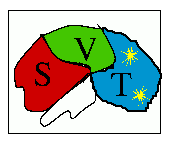 Probabilistic Atlases Currently Employed in SVT
Probabilistic Atlases Currently Employed in SVT

The latest version of the SVT package (SVT 5.3) incorporates the 272 sub-volumes
of interest (SVI's) included in the Sub-Volume Probabilistic Atlas (SVPA) for
Alzheimer's Disease (AD) population. More about the
AD-SVPA can be found here.
Below are cartoon representations of the transverse projection of this
probabilistic atlas and a stereotactic cortical model movie.
A summary of the html output of the SVT 5.3, using the Alzheimer's
Disease Anatomical Sub-Volume Probabilistic Atlas (AD-ASVPA) is contained
in here.


Our multi-subject SVT (Sub-Volume Thresholding) technique for
determining the statistically significant metabolic changes in functional
images uses probabilistic partitioning of the human brain. Such
probabilistic segmentations allows for variable thresholding of the data
and avoids the morphologic registration problems associated with the rigid
boundary partitionings. [MPEG movie (3 MB) courtesy of
MNI, McGill University]
Probabilistic structures of interest appear in the following order:
thalamus, putamen, caudate, insula, cerebellum, temporal lobes, occipital
lobes, parietal lobes, and frontal lobes.

A future version of the SVT package will allow the user to incorporate
their own probabilistic atlas reflecting the aim of the functional analysis
and the anatomy and metabolism of the brains of the subjects involved in the
study. There are a few extra routines necessary for such extension:
One is simply determining the smallest bounding boxes of the sub-volume
probabilistic partitioning regions and is used for optimization purposes;
Another one determines the estimates for the variance "correction factors",
for each sub-volume, which are employed by the SVT statistical methodology.
 © 1997 Ivo D. Dinov,
( >
© 1997 Ivo D. Dinov,
( >  )
)








 )
)